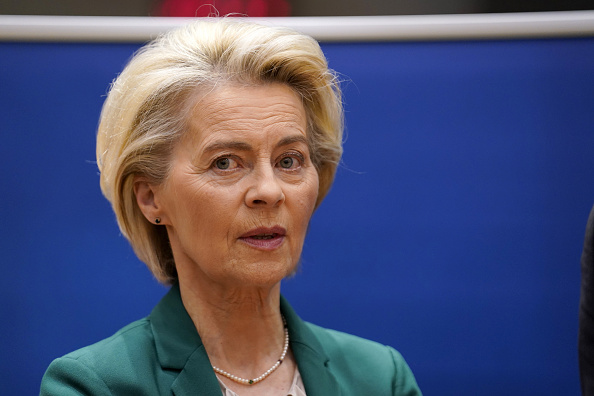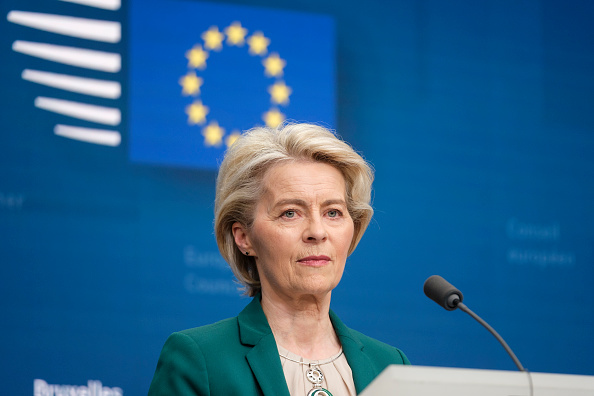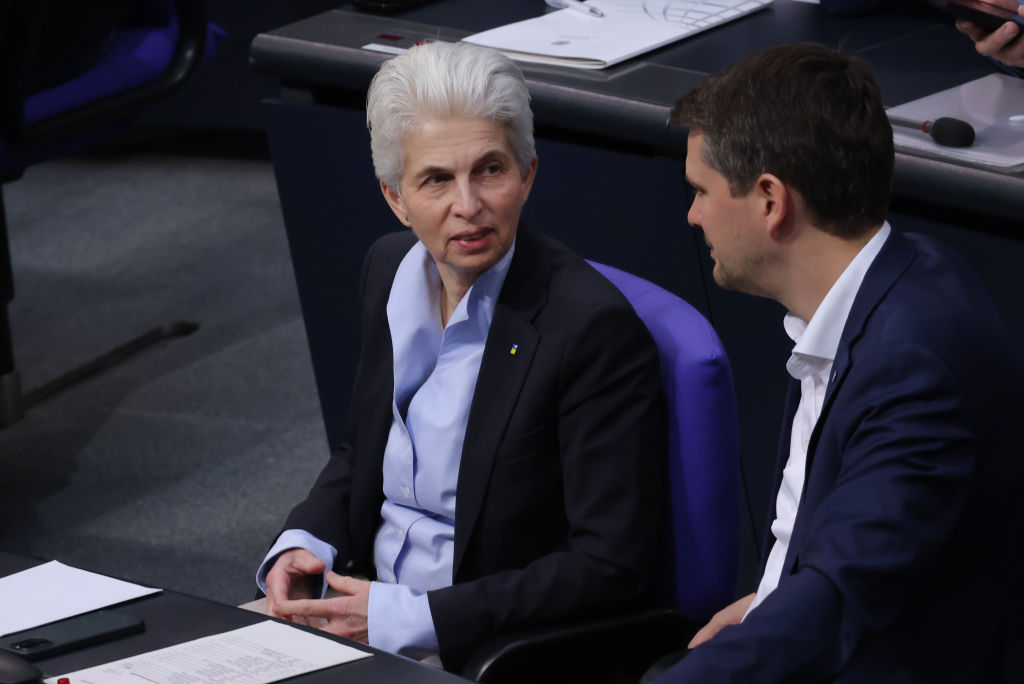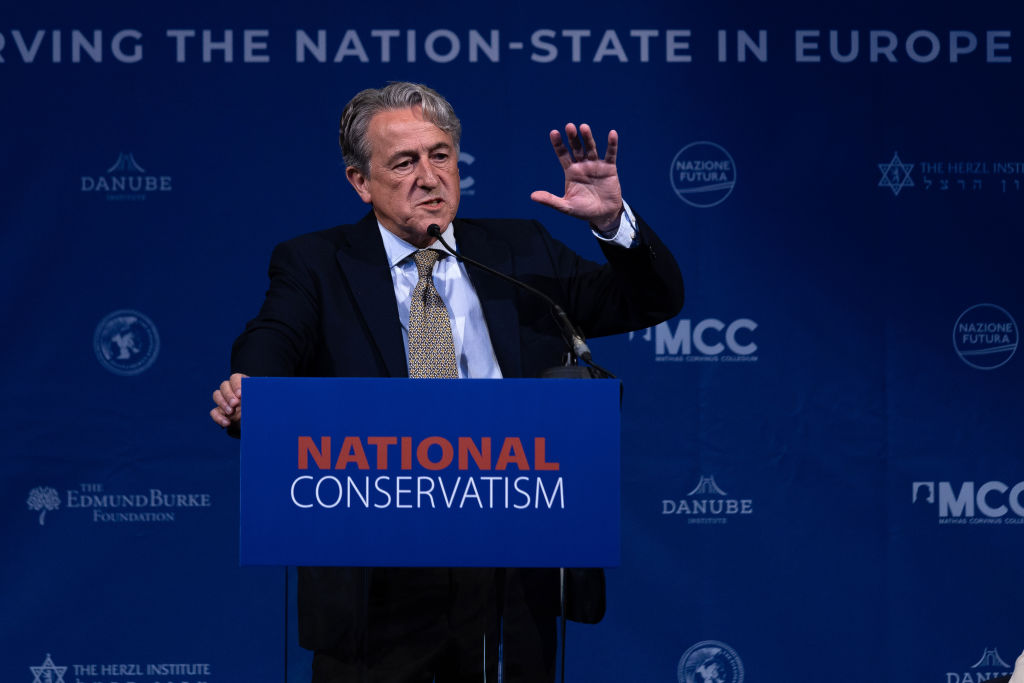Ursula von der Leyen looks increasingly likely to fall short of majority support in the European Parliament for her re-appointment.
With two delegations of her own EPP bloc saying they will not back her, she can only count on 167 votes from her own party–a long way off from the 361 votes she needs.
The “re-election of Ursula von der Leyen seems less likely now than a week ago”, said Mats Engström, a senior policy fellow at the European Council on Foreign Relations.
Whether von der Leyen will gain another term as European Commission President – and remain living in the top floor of the Berlaymont building, where she has moved in and rarely leaves – is ultimately up to the European Parliament.
There, she faces a tricky prospect.
When she won her first term as EC chief in 2019, she could count on the votes of her European People’s Party (EPP), the Socialists, the Greens and the Liberal Renew Europe group.
That same coalition today – the EPP 179, Socialists 136, Greens 50, Renew 89 today (on the most recent seat projections) – would in theory give her 454 votes out of 720.
Except, it is not that simple.
In reality, she received a majority of just nine votes in the European Parliament’s secret ballot in 2019 – with only 383 voting for her.
In theory, she should have expected 516 votes (182 from the EPP, 154 Socialist & Democrats, 74 Greens/EFA, 106 Renew).
Some 410 MEPs had made public pledges to support her, or their parties had, said French magazine Le Grand Continent at the time.
But some MEPs – especially from the Socialists and Democrats (S&D) – had second thoughts when shielded by a private ballot.
Other parties, such as Poland’s PiS, Hungary’s Fidesz and Italy’s M5S, might have publicly claimed support to gain leverage over von der Leyen, yet preferred her to win by a smaller margin.
The Socialists & Democrats have drawn a red line over co-operating with von der Leyen if she makes a deal with the European Conservatives and Reformists group (ECR), which Italy’s Prime Minister Giorgia Meloni currently heads. In Berlin, the S&D bloc made an “unshakable promise to voters” on May 4 to have “no co-operation or alliances with [the] ECR or ID”.
And the S&D, Liberals and Greens all voted on May 8 to approve procedures intended to hobble “Queen Ursula” – as her opponents increasingly characterise what they see as her aloof and secretive style of leadership.
Starting next term, whoever is EC president will need to submit to a “special scrutiny session” from MEPs, “without a pre-defined theme”, according to the European Parliament.
In a sign, perhaps, of a fraying coalition, the EPP voted against the amendment, which passed nonetheless.
Senior EPP leaders are wary of relying on the S&D bloc, after the experience of 2019.
“I only note that when it came to elections, the agreements we made with the Socialists were generally not honoured,” Daniel Caspary, the CDU/CSU’s leader in the European Parliament, told reporters on May 2.
EPP figures do not appear to be relying too much on the Greens, saying they “are welcome to join, but they have to deliver [votes] and not just make demands”, according to Caspary.
The 74 Green MEPs are unimpressed by von der Leyen’s “remarkable turnaround” in the speech launching her campaign, which promised “less Green Deal, more industry”, said Michael Hack, a Brussels-based lobbyist.
The Greens/EFA lead candidate, Bas Eickhout, attacked von der Leyen for “scaling down and really watering down” the Green Deal in the lead candidates’ first of two debates April 29.
Individual Green MEPs have rejected von der Leyen’s reappointment, such as Ireland’s Grace O’Sullivan, who said at a recent Dublin debate that leadership from von der Leyen has been “severely lacking”.
It is also unclear that von der Leyen could count at all on Renew’s 89 votes.
Already several Renew MEPs, such as Ireland’s Barry Andrews on March 28, have said in debates they would not vote to re-elect her due to her “terrible missteps”.
She owes her current position largely to France’s President Emmanuel Macron, whose Renaissance coalition (projected to win 14-19 MEPs in June, down from 23) is part of Renew, with its own lead candidate, Valérie Hayer.
Hayer has hardly been throaty in her endorsement of von der Leyen: “I won’t rule out voting for her again, I won’t rule out not voting for her again,” she said in April.
Macron’s support in 2019, though, was conditional on a top job going to France–in the end, Christine Lagarde became head of the European Central Bank.
And the French PM has been discussing another deal with Meloni – involving Mario Draghi or another “technocratic” candidate as a possible EC head.
The “technocratic” idea is a pointed response to a von der Leyen who vowed to head a “geopolitical Commission”.
“The Commission presidency is there to defend the general interest, so it must not be over-politicised,” said Macron in Brussels in March.
“Which, it has to be said, was not at all the case with this outgoing Commission,” he added.
In the backroom-dealing in the European Council, Macron’s Renew group could look to put Estonian PM Kaja Kallas up for the office of EU High Representative, while a Socialist & Democrat member (such as Portugal’s PM Antonio Costa or Danish PM Mette Frederiksen) took over as president of the European Council.
Whether individual Renew and S&D MEPs would then vote for this, in a secret ballot, is a different matter – as 2019 illustrated.
Another scenario could feature Meloni throwing the ECR’s projected 83 seats behind von der Leyen – a move that would cause her to lose the Socialists and probably the Greens/EFA as well. But 179 plus 83 only comes to 262.
Even if von der Leyen could somehow manage to keep all of Renew while doing a deal with Meloni’s bloc, this only brings her to 351 – but she needs 361.
Most of the defectors in 2019 probably came mainly from outside von der Leyen’s EPP, according to Le Grand Continent.
According to polls in early May this year, von der Leyen’s EPP is projected to secure between 174 to 179 seats in the chamber of 720 – down from 187 seats in a post-Brexit chamber of 705.
Except she cannot take for granted all the votes of her own EPP, either; she will have to do without France’s Les Républicains – a member of her own EPP group.
“We did not support her in 2019. We will not support her in the coming election,” the party’s executive vice-president François Xavier-Bellamy told France’s Inter radio February 20.
“We consider that her record does not measure up to what Europe expects today”, he added, calling her French President Emmanuel Macron’s “candidate”.
So that – presumably – rules out the between five and eight seats Xavier-Bellamy’s party (that now has eight MEPs) will win according to polling firm Elabe on May 3.
At the EPP congress to select the party’s lead candidate on March 7, von der Leyen only received 400 votes from the 737 voting delegates.
Along with Les Républicains, the four-member Slovenian delegation voted against her in Bucharest, too.
Taking out 12 French and Slovenian votes from 179, would mean she will begin with 167 EPP votes – maybe.
And 167 is a long way off indeed from 361.





